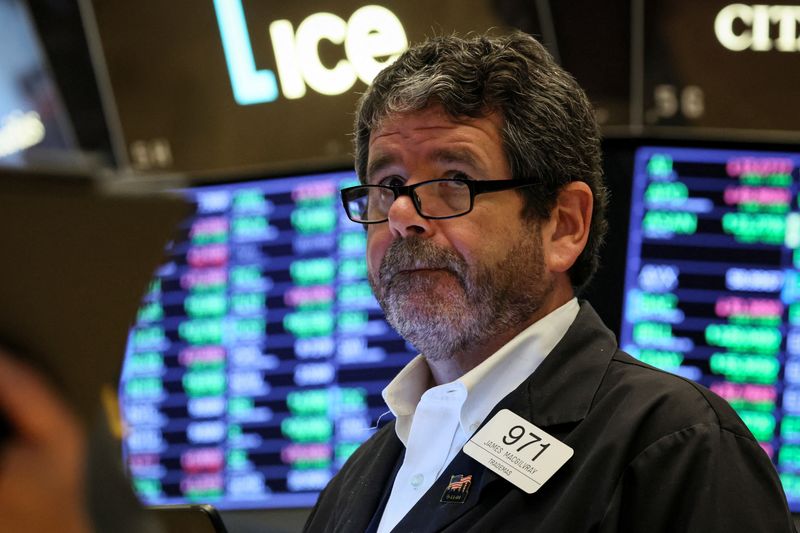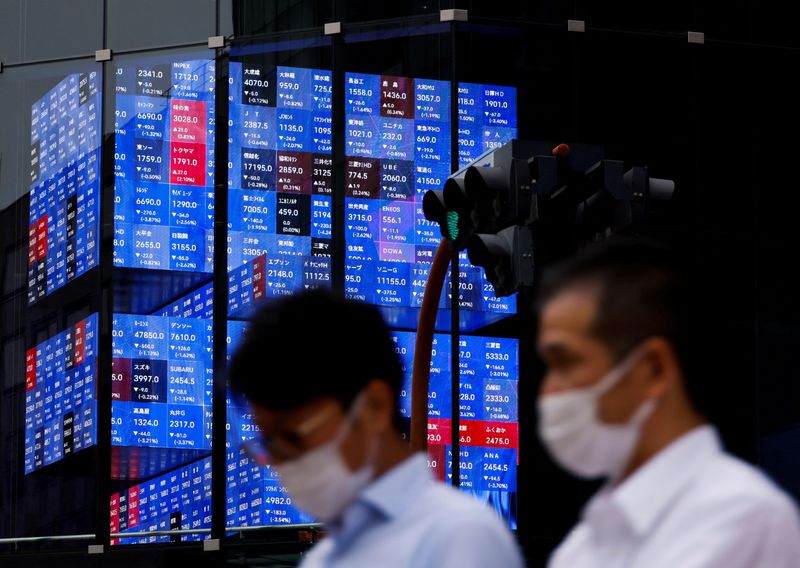By Lawrence Delevingne
(Reuters) - Wall Street and global stocks slumped further on Friday, with government bond yields and the dollar holding near recent peaks, as higher-than-expected inflation capped a nasty third quarter for world markets.
Fresh personal consumption expenditures (PCE) price index data, tracked by the U.S. Federal Reserve as it considers more interest rate hikes, showed a rise of 0.3% last month after dipping 0.1% in July. Euro zone inflation also hit a record high of 10% in September, surpassing forecasts, flash inflation data showed.
Fed Vice Chair Lael Brainard said the U.S. central bank would need to maintain higher interest rates for some time as part of its effort to tame inflation and must guard against lowering rates prematurely.
Quincy Krosby, chief global strategist for LPL Financial (NASDAQ:LPLA) in Charlottesville, Virginia, said the new price index data "did little to assuage fears that the campaign to curtail inflation is working as quickly as hoped by the market."
All three major Wall Street indexes finished down around 1.5% after a day of choppy trading.
It was the third consecutive weekly decline for the S&P 500 and the Dow Jones Industrial Average, and all three indexes, including the Nasdaq Composite, were down for the second month in a row.
In the first nine months of 2022, Wall Street suffered three straight quarterly declines, the longest losing streak for the S&P and the Nasdaq since the Great Recession and the Dow's longest in seven years.
Friday's losses cap a week of global market turmoil that saw stocks and currency markets, already rocked by recession fears, sapped further by a U.S. dollar at 20-year highs.
Asian shares outside of Japan fell 0.4% on Friday, down around 13% in September, their largest monthly loss since the start of the pandemic in 2020.
European shares saw some recovery, with Europe's STOXX 600 up 1.3%, but they notched a third consecutive quarter of losses on worry about the impact on global growth of central banks' hiking interest rates to counter inflation.
The MSCI world equity index, which tracks shares in 47 countries, fell 0.85% on Friday, down about 9.8% for the month and 7.3% for the quarter.
"We do not expect a sustainable rally in stocks until the Fed sees clear and multiple months of evidence that inflation is trending down," Andy Tepper, a managing director at BNY Mellon (NYSE:BK) Wealth Management in Wynnewood, Pennsylvania, said in an email.
European government bond yields fell, while Germany's 10-year yield was virtually flat at 2.118%, compared with Wednesday's peak of 2.352%, an 11-year high.
U.S. Treasury yields gained modestly. The yield on 10-year Treasury notes was up 6.9 basis points to 3.817%; the 30-year was up 7.3 basis points to 3.766%, and the two-year, which typically moves in step with interest rate expectations, was up 7.4 basis points at 4.244%.
Goldman Sachs (NYSE:GS) strategists forecasted that the Fed would deliver rate hikes of 75 basis points in November, 50 basis points in December and 25 basis points in February, for a peak rate of 4.5-4.75%, according to a client note released Friday.
The Bank of England will not raise interest rates before its next scheduled policy announcement on Nov. 3 despite a plummet in sterling, but would make big moves in November and December, a Reuters poll forecast.
European Central Bank policymakers have also voiced more support for a large rate hike.
The British pound, which was driven to all-time lows earlier this week on a combination of dollar strength and the government's plans for tax cuts funded by borrowing, rose about 0.35%, but still suffered its worst quarter versus the dollar since 2008.
The dollar index was flat on the day after hitting a 20-year high on Wednesday. The dollar index has risen about 17% this year.
COMMODITIES
Oil prices dipped in choppy trading but notched their first weekly gain in five on Friday, underpinned by the possibility that OPEC+ will agree to cut crude output when it meets on Oct. 5. Brent crude futures fell 0.6% to settle at $87.96 a barrel and U.S. crude tumbled 2.1% to $79.49.
Gold was little changed, wrapping up its worst quarter since March last year, pushed down by fears of ever-higher interest rates.

GRAPHIC - Global markets - Q3 2022
https://graphics.reuters.com/GLOBAL-MARKETS/zdpxolrzdvx/chart.png
